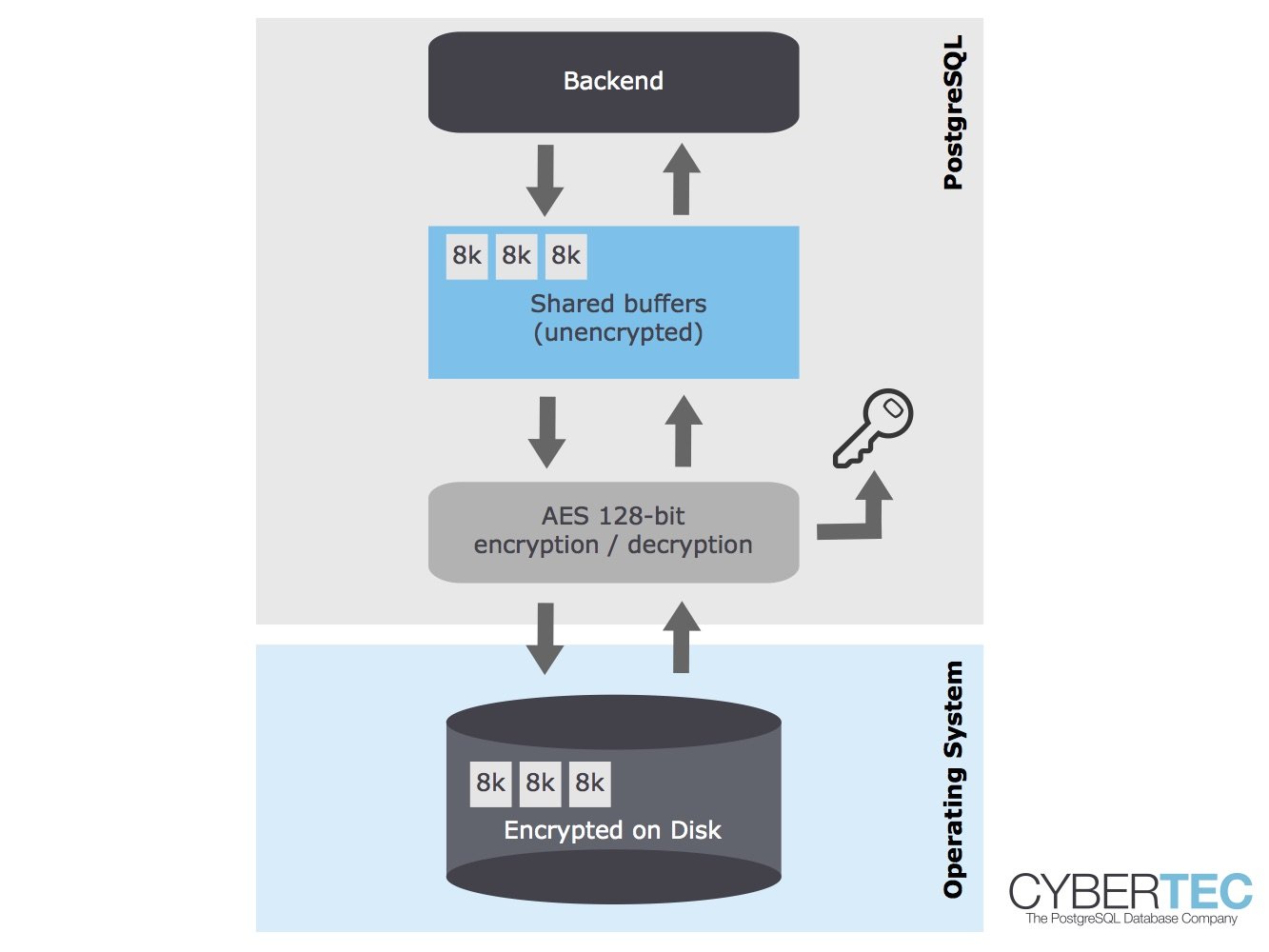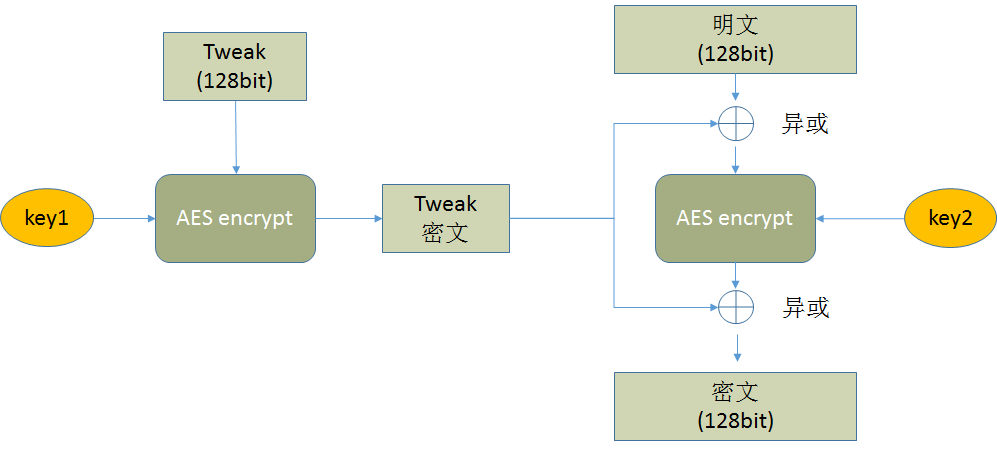Postgresql transparent data encryption is not support officially by PG community. But serveral commercial or open source third party build TDE on Postgresql old version, my target is to build transparent data encryption feature on PG latest version (12.1).
I do not want to re-invent the wheel since Cybertech, other company already implement this feature in PG 9.6, I plan to port this implementation into PG last version. (https://www.cybertec-postgresql.com/en/products/postgresql-transparent-data-encryption/)
- TDE概要设计和实现设计
- AES实现算法
- PG TDE 配置
- TDE测试和验证
md.c This code manages relations that reside on magnetic disk.
mdread() -- Read the specified block from a relation.
void mdread(SMgrRelation reln, ForkNumber forknum, BlockNumber blocknum, char *buffer)
mdwrite() -- Write the supplied block at the appropriate location.
This is to be used only for updating already-existing blocks of arelation (ie, those before the current EOF). To extend a relation, use mdextend().
void mdwrite(SMgrRelation reln, ForkNumber forknum, BlockNumber blocknum, char *buffer, bool skipFsync)
mdextend() -- Add a block to the specified relation.
The semantics are nearly the same as mdwrite(): write at the specified position. However, this is to be used for the case of extending a relation (i.e., blocknum is at or beyond the current EOF). Note that we assume writing a block beyond current EOF causes intervening file space to become filled with zeroes.
void mdextend(SMgrRelation reln, ForkNumber forknum, BlockNumber blocknum, char *buffer, bool skipFsync)
/backend/storage/file/buffile.c Management of large buffered files, primarily temporary files.
static BufFile *makeBufFile(File firstfile);
static void extendBufFile(BufFile *file);
static void BufFileLoadBuffer(BufFile *file);
static void BufFileDumpBuffer(BufFile *file);
static int BufFileFlush(BufFile *file);
xlog.c PostgreSQL transaction log manager
Write and/or fsync the log at least as far as WriteRqst indicates.
If flexible == TRUE, we don't have to write as far as WriteRqst, but may stop at any convenient boundary (such as a cache or logfile boundary). This option allows us to avoid uselessly issuing multiple writes when a single one would do.
Must be called with WALWriteLock held. WaitXLogInsertionsToFinish(WriteRqst) must be called before grabbing the lock, to make sure the data is ready to write.
static void XLogWrite(XLogwrtRqst WriteRqst, bool flexible)
I/O routines for pg_control
ControlFile is a buffer in shared memory that holds an image of the contents of pg_control. WriteControlFile() initializes pg_control given a preloaded buffer, ReadControlFile() loads the buffer from the pg_control file (during postmaster or standalone-backend startup), and UpdateControlFile() rewrites pg_control after we modify xlog state.
For simplicity, WriteControlFile() initializes the fields of pg_control that are related to checking backend/database compatibility, and ReadControlFile() verifies they are correct. We could split out the I/O and compatibility-check functions, but there seems no need currently.
static void WriteControlFile(void)
xlogutils.c
PostgreSQL transaction log manager utility routines
Read 'count' bytes from WAL into 'buf', starting at location 'startptr' in timeline 'tli'.
Will open, and keep open, one WAL segment stored in the static file descriptor 'sendFile'. This means if XLogRead is used once, there will always be one descriptor left open until the process ends, but never more than one.
XXX This is very similar to pg_xlogdump's XLogDumpXLogRead and to XLogRead in walsender.c but for small differences (such as lack of elog() in frontend). Probably these should be merged at some point.
static void XLogRead(char *buf, TimeLineID tli, XLogRecPtr startptr, Size count)
slru.c Simple LRU buffering for transaction status logfiles
Physical read of a (previously existing) page into a buffer slot
On failure, we cannot just ereport(ERROR) since caller has put state in shared memory that must be undone. So, we return FALSE and save enough info in static variables to let SlruReportIOError make the report.
For now, assume it's not worth keeping a file pointer open across read/write operations. We could cache one virtual file pointer ...
static bool SlruPhysicalReadPage(SlruCtl ctl, int pageno, int slotno)
Physical write of a page from a buffer slot
On failure, we cannot just ereport(ERROR) since caller has put state in shared memory that must be undone. So, we return FALSE and save enough info in static variables to let SlruReportIOError make the report.
For now, assume it's not worth keeping a file pointer open across independent read/write operations. We do batch operations during SimpleLruFlush, though.
fdata is NULL for a standalone write, pointer to open-file info during SimpleLruFlush.
static bool SlruPhysicalWritePage(SlruCtl ctl, int pageno, int slotno, SlruFlush fdata)
dbcommands.c atabase management commands (create/drop database).
DATABASE resource manager's routines void dbase_redo(XLogReaderState *record)
CREATE DATABASE Oid createdb(const CreatedbStmt *stmt)
ALTER DATABASE SET TABLESPACE static void movedb(const char *dbname, const char *tblspcname)
This is whole database encryption implementation, user has no choice to choose which database is encrypted, which one is not encrypted. this is known limitation.
- https://www.postgresql.org/
- https://www.cybertec-postgresql.com/
- https://oyo-byte.github.io/2018/10/25/postgresql_fde_encryption/
- http://momjian.us/
- https://billtian.github.io/digoal.blog/
- 《PostgreSQL数据库内核分析》
- 《PostgreSQL技术内幕》


